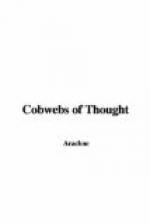“If OEdipus had had the inner refuge of a Marcus Aurelius, what could Destiny have done to him?” asks Maeterlinck. Fate we suppose would have had no power over him, if he had calmly reasoned over the terrible circumstances in which he found himself involved, and if he preserved his equanimity to the end, as M. Aurelius would have done. Does this prove more than that the two men may have had very different temperaments? But, individuality cannot be made to agree with theory, and can be tabulated in no science book of humanity. When Maeterlinck says, “Hamlet’s ignorance puts the seal on his unhappiness,” we may well ask ignorance of what? Was it ignorance of the power of will? Certainly his intellect was greater than his will. “He would have been greater had he been less great.” The “concentration of all the interests that belong to humanity” was in Hamlet. Except the gifts of serenity and calmness, what did he lack? And because he was not inwardly serene, Maeterlinck considers him blind and ignorant. It is strange to connect blindness and ignorance with a wit of intellectual keenness, an imagination of a poet, and the unflinching questioning of the philosopher. Maeterlinck says: “Hamlet thinks much but is by no means wise.” How does Hamlet show he had not the wisdom of life? Maeterlinck, no doubt, would dwell on his varying moods, his subtle melancholy, his nature baffled by a supernatural command. If he was not wise how strange he should have said so many words of truest wisdom both of Life and Death, “If it be now, ’tis not to come; if it be not to come, it will be now; if it be not now, yet it will come; the readiness is all.” We feel that Hamlet was “a being with springs of thought and feeling and action deeper than we can search.” But the elements in his nature could not resolve themselves into an inner life of calm. Therefore, according to Maeterlinck, he was not wise, for he could not conquer his inner fatality—destiny in himself. Maeterlinck’s ideas are very beautiful, and he writes delightfully, but his test of wisdom is questionable, for Hamlet’s thoughts have captured and invaded and influenced the best minds and experiences of thinkers for centuries, How many a Shakespearean reader has felt that Hamlet is one of the very wisest of men as well as one of the most lovable and attractive! Not his ignorance, but his wisdom has borne the test of study and time. He did not bear the tragedy of life when the supernatural entered it, with an unshaken soul, but ourselves and the realities of life become clearer to us, the more we read his thoughts. If “it is we who are Hamlet,” as Hazlitt said, it is a great tribute to his universality—but a greater one to ourselves. Indeed, we learn wisdom, not only from the lucubrations of the serene and calm, or from Hamlet, magnificent in thought, acute and playful, but also from Hamlet in his mortal struggles, in his deep questionings, and his melancholy.




